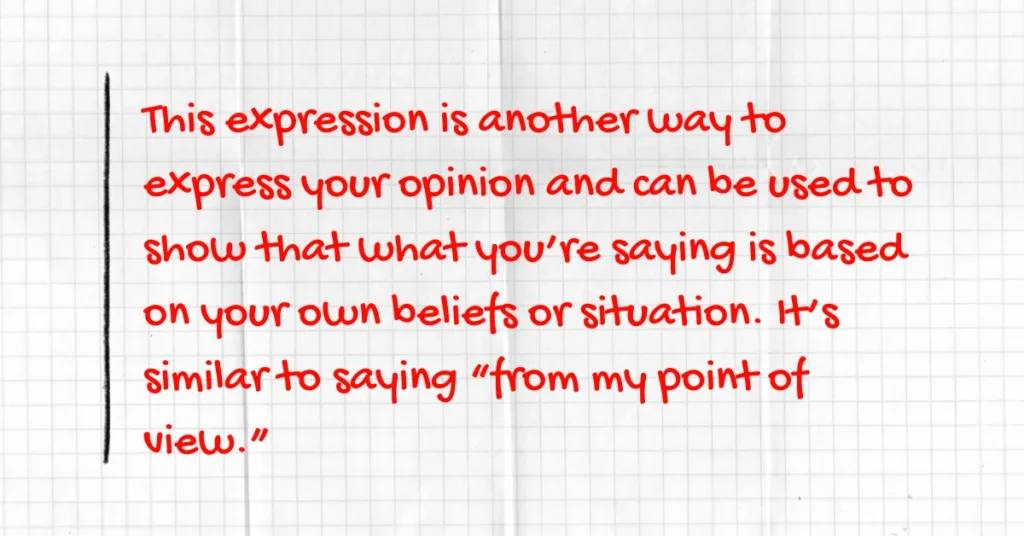Have you ever wanted to share or express opinions in English but weren’t sure how to start? Whether you’re talking with friends, giving a presentation, or writing an email, expressing what you think is an important skill. In this lesson, we’ll show you some easy and useful ways to say what you believe or feel. You don’t need to be an expert to share your thoughts clearly! By learning these simple phrases, you’ll sound more natural and confident when speaking or writing in English.
Being able to express your thoughts and ideas is an essential part of communication, whether you’re having a casual conversation, participating in a discussion, or even writing an essay.
There are many ways to share your point of view, and learning the different expressions for opinions will help you sound more natural and confident in your English-speaking interactions.
19 Ways to Express Opinions in English

Let’s break down some useful phrases that you can use to express your opinions clearly.
1. “I think…”
This is one of the most common and simple ways to express your opinion. You can use this phrase when you’re sharing an idea or belief that you hold. It’s informal and can be used in everyday conversations.
- Example: “I think the weather is going to be great today.”
- When to use it: Use “I think” when you want to express your thoughts or when you’re not 100% sure but still have a belief or idea.
2. “In my opinion…”
This phrase is a little more formal than “I think,” but still widely used in both spoken and written English. It shows that what follows is your personal perspective or belief.
- Example: “In my opinion, technology has greatly improved our lives.”
- When to use it: This is good for discussions where you want to emphasize that the idea is based on your personal views, particularly in more formal situations.
3. “Personally, I believe…”
This phrase helps you show that the following opinion is deeply personal. It can be used when you want to highlight that the idea or belief is uniquely yours.
- Example: “Personally, I believe that education should be free for everyone.”
- When to use it: Use this expression when you want to make it clear that the opinion is your own, especially when discussing sensitive topics.
4. “It seems to me that…”
This phrase indicates that your opinion is based on what you observe or how you interpret a situation. It suggests that you are sharing an assessment or understanding rather than an absolute truth.
- Example: “It seems to me that the project is falling behind schedule.”
- When to use it: This phrase is useful when you’re discussing something based on evidence or observation, but you’re open to other perspectives.
5. “From my perspective…”
Using this expression helps you emphasize that you’re presenting your view from a particular angle or way of thinking. It’s often used in more complex or professional discussions. [express opinions]
- Example: “From my perspective, the new policy might be too restrictive.”
- When to use it: This phrase is especially useful when talking about situations where people might have different viewpoints based on their roles, experiences, or knowledge.
6. “I’m of the view that…”

This expression is a bit more formal and is typically used in professional or academic settings. It conveys a strong belief or position on a particular issue.
- Example: “I’m of the view that climate change is one of the most pressing issues of our time.”
- When to use it: Use this when you want to state your opinion firmly, particularly in debates or discussions that require a serious tone.
7. “It’s my contention that…”
This is a more formal way to express an opinion, often used in discussions that involve argumentation or when you are making a strong statement.
- Example: “It’s my contention that social media is having a negative impact on real-world communication.”
- When to use it: This phrase is suitable when presenting a debated or argued point of view in more formal discussions or presentations.
Read: 13 Difference Between Like Something or Like Someone
8. “It’s clear to me that…”
This phrase shows confidence in your opinion and implies that the conclusion you have drawn is obvious or self-evident.
- Example: “It’s clear to me that the team is working hard to meet deadlines.”
- When to use it: Use this expression when you want to emphasize that your opinion is based on obvious facts or evidence.
9. “If you ask me…”
This phrase is often used to introduce your personal opinion in a conversational tone. It’s informal and shows that you’re sharing your personal point of view, even if others may not agree.
- Example: “If you ask me, we should all work together to solve the issue.”
- When to use it: Use this when giving your opinion casually, and you might expect others to have different views.
10. “As far as I’m concerned…”

This expression is another way to express your opinion and can be used to show that what you’re saying is based on your own beliefs or situation. It’s similar to saying “from my point of view.”
- Example: “As far as I’m concerned, the project is complete.”
- When to use it: Use this when you want to make it clear that your opinion is based on your own circumstances or perspective.
11. “I have no doubt that…”
This phrase is used when you want to express absolute certainty about your opinion. It shows that you’re confident in your belief and don’t see any reason to doubt it.
- Example: “I have no doubt that she will succeed in her new role.”
- When to use it: Use this when you want to express a strong conviction or certainty about your opinion.
12. “I can’t help but feel that…”
This expression conveys that your opinion or feeling is strong, and it might be based on emotion or intuition rather than hard evidence.
- Example: “I can’t help but feel that something is wrong with the situation.”
- When to use it: This is useful when discussing feelings or emotions and when your opinion might not be based on clear facts.
13. “To my way of thinking…”
This phrase introduces your opinion in a reflective manner, suggesting that what follows is your personal reasoning or thought process.
- Example: “To my way of thinking, there’s a better solution to the problem.”
- When to use it: Use this when you want to show that you are thinking critically or evaluating a situation from your own perspective.
14. “I hold the opinion that…”
This expression is a bit more formal and is often used to convey a deeply held belief or position on an issue. [express opinions]
- Example: “I hold the opinion that environmental sustainability is essential for future generations.”
- When to use it: This is great when expressing a strong or serious belief, especially in discussions or debates.
15. “It’s crystal clear to me that…”
This phrase is used to show absolute clarity or certainty in your opinion. It implies that the issue is so clear that there is no room for doubt.
- Example: “It’s crystal clear to me that we need to improve our customer service.”
- When to use it: Use this when you want to make your opinion very strong and clear.
Read: 19 Essential Daily Phrases For Natural Fluency
16. “It’s my honest belief that…”
This phrase communicates sincerity in your opinion. It suggests that the opinion you are expressing is not just an argument but something you truly believe in.
- Example: “It’s my honest belief that we should all make an effort to support local businesses.”
- When to use it: Use this expression to show that you genuinely believe in what you’re saying, especially in persuasive or ethical conversations.
17. “I stand by the belief that…”
This phrase shows that your opinion is unwavering and you continue to support it, even if others disagree.
- Example: “I stand by the belief that education is the key to social progress.”
- When to use it: This is useful when defending an opinion that may be challenged by others.
18. “My impression is that…”
This phrase indicates that your opinion is based on your feelings or impressions rather than solid facts. It suggests that you are speaking from a general understanding.
- Example: “My impression is that the meeting went well, but we could improve communication.”
- When to use it: Use this when you want to express a tentative or preliminary opinion.
19. “It’s my honest assessment that…”
This phrase is similar to saying “It’s my honest belief,” but it conveys a more evaluative or analytical approach to the situation.
- Example: “It’s my honest assessment that the project could have been completed more efficiently.”
- When to use it: Use this when you want to convey that you’ve considered the situation carefully and are offering a thoughtful opinion.
Conclusion:
Expressing your opinion in English can be done in many ways, each suited to different contexts, levels of formality, and personal style to express opinions in English. By using these phrases, you can communicate your thoughts clearly, confidently, and with variety. Whether you’re in a casual conversation or a formal debate, these expressions will help you sound more fluent and persuasive.
Try practicing these phrases in your conversations or writings to get more comfortable expressing your opinions in English.
Explore More
- 8 Other Words for Happening “One After Another”
 One after another: Do you ever struggle to describe events that happen continuously, without a …
One after another: Do you ever struggle to describe events that happen continuously, without a … - 20 Binomial Expressions You Need to Know
 Binomial expressions: Have you ever heard phrases like “give or take” or “sick and tired” …
Binomial expressions: Have you ever heard phrases like “give or take” or “sick and tired” … - 8 Winter Phrasal Verbs
 Are you ready to warm up your language skills this winter? Today’s lesson is all …
Are you ready to warm up your language skills this winter? Today’s lesson is all … - 101 Other Ways to Say “I Love You”
 This lesson is going to be unforgettable this will add a touch of romance to …
This lesson is going to be unforgettable this will add a touch of romance to … - 5 Phrases for Forgetting to Do Something
 Phrases for Forgetting to Do Something: Have you ever been in the middle of a …
Phrases for Forgetting to Do Something: Have you ever been in the middle of a …




